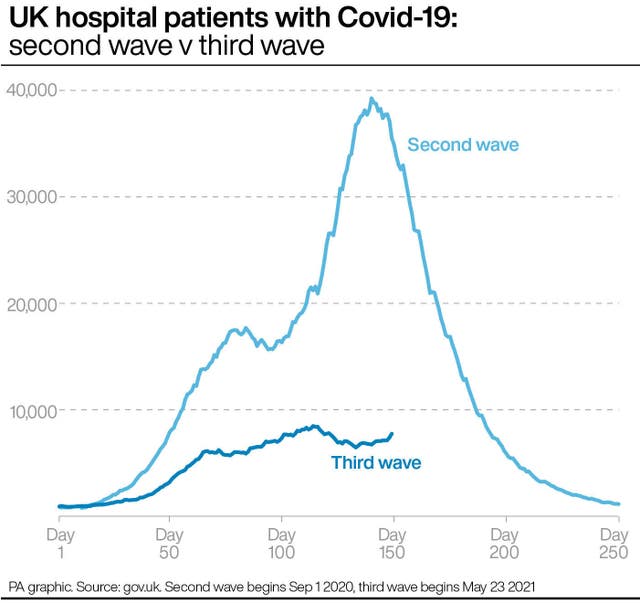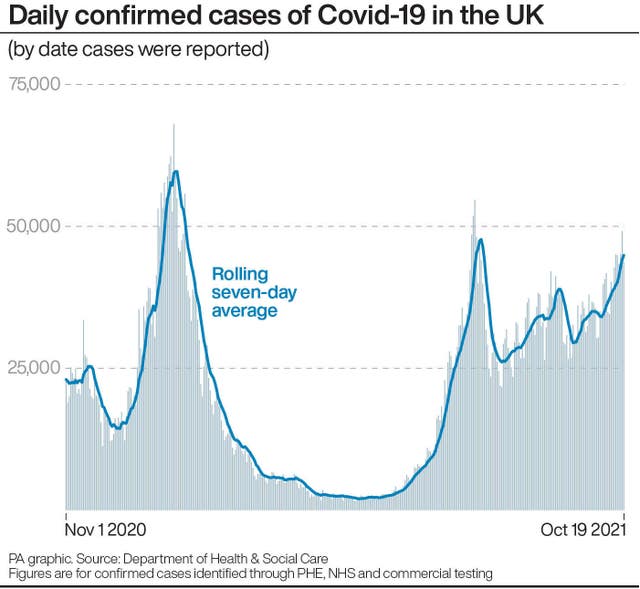Government rejects health chief’s call for coronavirus ‘Plan B’ as cases surge
Cabinet minister Kwasi Kwarteng said it is not the time to reintroduce restrictions in England.

Boris Johnson’s Government is resisting calls from a health chief to immediately reimpose some coronavirus restrictions to prevent a winter NHS crisis.
Cabinet minister Kwasi Kwarteng said it is not time to introduce “Plan B”, which could see requirements to wear face masks and the compulsory use of vaccine passports to enter England’s nightclubs and other crowded venues.
But Matthew Taylor, chief executive of the NHS Confederation which represents health bodies, warned “we risk stumbling into a winter crisis” unless measures are introduced now.
He called for ministers to come up with a “Plan C” of even tougher restrictions if those measures are insufficient to address pressure on the health service.
The NHS Confederation’s warning came as coronavirus deaths in the UK rose to their highest daily level since early March, while cases are at their highest for almost three months.
England’s autumn and winter coronavirus strategy includes “Plan B” as a contingency measure if the NHS comes under unsustainable pressure.
That could include legally mandating face coverings in some settings, introducing mandatory vaccine-only Covid-status certification and asking people to work from home.
Business Secretary Mr Kwarteng said the Government does not “feel that it’s the time for Plan B right now”.
He told BBC Breakfast the return to normal life had been “very hard won”, adding: “The infection rate was always likely to go up as we opened up the economy, because as people get back to normal life, the infection rate was likely to go up.
“But what was critically important was the hospitalisation rate and the death rate as well.”
He insisted the Government is not “waiting and watching” as those figures rise.
He said: “We’re simply trying to analyse the data as we see it and come up with the right policies.
“Now, that’s something which could change but, at the moment, we think that the course that we’re plotting is the right one.”
Mr Kwarteng added, however, that it is a “good thing” for people to wear masks in public places.
“I think people should do what they feel is the right thing to do,” he said. “They’ve got to, I think, be respectful towards other people, they’ve got to keep themselves safe and the public as well.”
England’s chief medical officer, Professor Chris Whitty, stressed the importance of mask-wearing and also encouraged people to take up the offer of a vaccination.
“Covid-19 cases are rising and winter is drawing closer,” he said. “Ventilation, masks in crowded indoor spaces and hand-washing remain important.”
The NHS Confederation is the membership organisation that represents the whole healthcare system in England, Wales and Northern Ireland.
Mr Taylor said the NHS is preparing for what could be “the most challenging winter on record” and urged the public to “show extra support for the NHS” by “behaving in ways that will keep themselves and others safe”.
He added: “It is time for the Government to enact Plan B of its strategy without delay because without pre-emptive action, we risk stumbling into a winter crisis.
“Also, health leaders need to understand what a ‘Plan C’ would entail if these measures are insufficient.

“The Government should not wait for Covid infections to rocket and for NHS pressures to be sky high before the panic alarm is sounded.”
Mr Taylor said if the Government “fails to get a grip” on rising coronavirus cases, the nation’s recovery from the pandemic could be “put at risk”.
On Tuesday, the Government said a further 223 people had died within 28 days of testing positive for Covid-19 – bringing the UK total to 138,852.
While the numbers are often higher on Tuesdays because of a lag in reporting deaths and cases over the weekend, this is the highest figure for daily reported deaths since March 9.

Meanwhile, the seven-day average for cases is standing at 44,145 infections per day – the highest level for almost three months.
Despite the success of the initial Covid-19 vaccination campaign, there are concerns in Westminster around the take-up of booster shots and jabs for 12 to 15-year-olds.
Mr Kwarteng told Sky News the slow uptake in this phase of the programme is “something that we really need to address”.
Just over 67% of the UK population has received two doses of vaccine, according to Government figures – compared with at least 75% in Denmark, 79% in Spain and 86% in Portugal.
In a sign of the growing concern in Whitehall, Prof Whitty said “if you have not been vaccinated, now is the time” and “if you are offered a booster, please take up the offer”.





